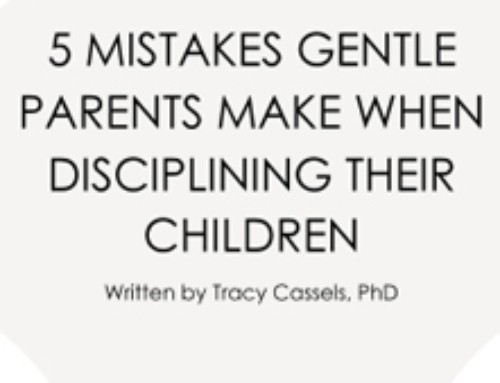
Don’t do this.
You want to be respectful.
You want your child to know that they are heard.
So you ask them to do things. Like get dressed, clean up the toys, take their plate in, and so on. Because it doesn’t sound right to simply command them.
But what if they say “no”?
This is the dilemma that many parents face, starting when they’re kids are young. I have spoken with many families who struggle because they will, for example, ask their child to come change the diaper and the child says no. Because it needs changing or risk something like diaper rash, they then move in and change it anyway, typically to a thrashing toddler/older baby who is upset by the whole ordeal. As kids get older, you see the same thing with toys. Parents will ask a child to clean up and the child simply doesn’t want to. Parents often resort to either extreme negotiations or extreme measures of threatening to remove toys.
The problem is that the request was never respectful to begin with.
I know, how can a request not be respectful? Isn’t that at the heart of respect?
It is, but only if you actually mean the other individual to have a full say in the matter. If you don’t, then you’re giving them a false sense of agency and then taking that away. It tells the child that you really don’t respect their opinion unless it conforms to what you want.
Let’s unpack this a bit to make sure I’m being clear…
Take the child who doesn’t want a diaper change. If we think about this scenario from their perspective, they have been asked to come for a diaper change. The asking implies there’s an opportunity to say ‘yes’ or ‘no’. So the child opts for ‘no’ because (a) diaper changes may not be fun, and (b) the child is otherwise engaged. The child also doesn’t understand the consequences of not having the diaper changed quickly, even though it’s the child who will suffer the consequences later. Once the child says no, the parent then says, “Well, it has to happen anyway” and takes the child over to do it. Clearly the child is upset, not only with the diaper change (which may be an issue as is), but also with the fact that his or her opinion was just completely disregarded.
What are the effects of this? Well, it makes the situation at the moment rather disappointing, but if it happens enough, it sets the stage for a child to feel unheard. The child’s voice doesn’t matter and he or she knows it. This is even more prominent for older kids when facing the issue of cleaning up or getting dressed or anything else because they are acutely aware that you just completely disregarded them.
Sadly, I hear all-too-often the recommendation to always start with a request then move to a command if the child doesn’t listen. I disagree entirely.
Respect is about making sure you value the other person’s input. And like all things in life, sometimes we don’t get a real say, or rather the consequences are clear enough that it’s not a real choice. I have to pay my taxes, regardless of my thoughts on the matter. I have to go grocery shopping when we’re out of food, even if I don’t feel like it.
It’s not disrespectful to make this clear to children.
It’s about balance.
This means that you have to be very careful about when you use commands, how you use them, how you react if you mistakenly make a request when you didn’t mean to, and how to respond to refusal.
When do you use commands?
I am a firm believer that there are only very few cases where you truly issue commands. The first area is when it involves safety or well-being. For example, my son can get very bad diaper rash if his diaper isn’t changed quickly (likely a result that goes with his yet-to-be-diagnosed intolerance that we’re working on) so I simply can’t leave him or else he will go through a day or two of extreme pain with each diaper change. This means that the change is a non-negotiable for us. Running towards the road will also issue a command.
One caveat to this is when it has to do with biological functions, even though many people view them as essential to well-being. You cannot force a child to eat or sleep or toilet in a particular manner. You can offer up healthy food options, but forcing a child to eat will increase the risk of later control issues around food. You can offer up an environment conducive to sleep, but if a child isn’t tired, they aren’t sleeping. And you can offer up a toilet to sit on, but you can’t have a child go if they aren’t ready and sitting on the toilet till they do is counterproductive as they end up resenting the entire experience and you end up with a much larger battle on your hands. So don’t make fights out of biological functions.
Another area that they can be used is when it comes to respect for the entire family. This is more about something like cleaning up after yourself, especially in public areas in the house. If you don’t want the mess around, then you have to be clear it’s not an option to leave it there. And as I’ll get to in the “how” section, you don’t issue threats either because that immediately takes the respect out of the equation. This respect extends to rules in other families as well and so if you are visiting someone, you want to make clear to your child that some rules will be different for the duration of the visit.
Finally, there may be socially-expected commands, like “you need to go to school” or “you can’t climb the table in the restaurant”. These can be trickier though because you really have to examine what is happening when a child refuses as there is likely something going on that needs to be explored. Again, I will get to this more in the “when a child refuses” subsection.
Outside of these areas, I firmly believe you have to offer your child the choice, explain the choice if they are capable of understanding, outline what you would like and why, and then allow the chips to fall as they may. You may not always get what you want, just as I’m sure you have disappointed others with your choices, but this is part of respecting your child as his or her own person and allowing them to grown and learn they are valued.
How do you use commands?
This probably seems weird – you command, right? Well, not really. How you deliver a command can have a huge impact on how your child interprets it.
The keys to respectful commands are: be calm, explain, and offer choices within. Yelling, threatening, or otherwise disrespectful speech is, inherently, disrespectful. (One obvious caveat is if you need to yell a distance over a safety concern to ensure your child hears you.) There is no room for this in any respectful relationship. Being calm and telling a child what needs to happen reflects that this is just something that really does need to happen. You aren’t berating them or making them feel poorly about themselves and thus the command can come across as intended – not a personal attack, but a statement of fact of something that needs to happen.
Explaining the why is quite important, especially for older children, but it helps to get in the habit with younger ones too. When you tell a child to clean up, explaining that the space is for everyone’s use and their mess is interfering with everyone else’s ability to use it makes clear that the issue is one of respect, not obedience. (Similarly, be open to your child asking you to clean up or do something to help them enjoy spaces too. If you refuse or balk at their requests you are setting the stage for them to copy you and do the same.)
And as with most things in life, offering choices within a command often helps to show the child that you are still respecting them. For the diaper change example, you may ask the child what toy they want to hold while they get their diaper changed. For cleaning, you may want to offer times to do it if your child is engaged with something else. The choices also give a sense of control to your child and as humans, we all want to have some agency over our actions so the more we can provide that for them, the better.
What if you accidentally use a request?
Well, if your child accepts, breathe and move on. If they don’t, I recommend accepting it for a time being then waiting to issue the command the next time. This may be as early as 5 minutes if it’s something to do with well-being (like the diaper change) or may be as long as a few hours if it’s not urgent. The key is to realize that you’ve made the mistake, not your child, and reflect on how you can be respectful to their opinion and then change your behaviour for the next time.
What if my child refuses?
Let’s be honest – a child doesn’t need a request to say no. They can equally say no to a command as well, no matter how kindly phrased it is. Too often, I see this turn into power battles because parents are now told their child is being “defiant”. There are a few things you should be looking at when you face this (immediate safety concerns aside):
- What frame of mind is your child in? If he or she is tired, hungry, upset, lonely, or angry then they may say no because of that. Make sure your child isn’t experiencing any of these emotions when speaking to your child. If you know something in this list is at play, address that first, it is far more important.
- Is your child feeling connected? This goes a bit towards the “lonely” above, but in more depth. If your child doesn’t feel connected with you (and they need a lot of love to feel this) then they are more likely to refuse anything. Viewing refusal as a cry for connection is one of the safest bets you can make.
- Is there an underlying issue? This probably speaks more to the respect or social elements over safety, but sometimes something else is going on and we see a reflection with refusals. For example, a child who doesn’t want to clean may feel like he or she doesn’t have control at home and so exploring ways to make that happen is important. A child who doesn’t want to go to school may be struggling in ways and not opening up about it. You need to view refusal as a signal, not an end-behaviour.
- How have you responded to compliance in the past? Sometimes it’s just that we don’t show our appreciation enough. A child who cleans and gets no response or perhaps a “finally” isn’t going to feel good about doing it. Making the time to thank the child and tell him or her that it means something to you that they did it means they are more likely to help out in the future.
Respect doesn’t mean requests, but it does mean an overall tone that tells your child how much you value them. Make your focus about your connection and how you approach these interactions and you will likely find that respect becomes a part of your family style very quickly.






Hi Tracy,
I am one of three teachers is a classroom of twenty one 3 and 4 year olds. I have 3 children of my own who are now adults. I am so very grateful for your insight and wisdom. I read your posts eagerly, and find many connections to my own beliefs about how children grow and learn. Luckily I work within a child centered system that privileges relationships, and we have the time and space to build strong and trusting relationships with the children in our care. I find I can apply much of what you write about to my daily interactions with children, and greatly appreciate having your blog as a resource to inspire and guide me in my work. Heartfelt thanks!
Thank you so much! I’m so glad your school is so child-centered as there seem to be too few these days. And how lucky for your kids to have you who clearly cares so much for them 🙂